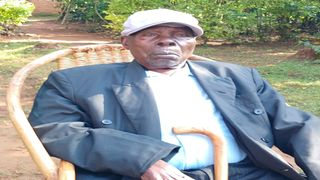
Mzee Joseck outside his house at Khungema village in Kakamega County.
Kakamega
Premium
A century of kindness, heroism and wisdom: World War II veteran Joseck Mwambayi’s life
A centenary is not a milestone that many people live to see, and those who do are a talking point.
Take World War II veteran, farmer and writer Joseck Okwako Mwambayi, who turned 100 at the weekend — born in 1923 as the second child in a family of six in Ekambara village, Lureko location in Mumias, Mr Mwambayi is believed to be one of the oldest people in Kakamega County.
He joined Bujumba Primary School in Busia in 1934.
In 1942, he was recruited into the British Army's East African Artillery and served in Madagascar, Mauritius, Sri Lanka and Burma.
"They didn't give us a choice whether to go into the army, the navy or anything else. They decided for us and their word was final," Mr Mwambayi recalls.
He remembers that while in Sri Lanka, they were taken into the forest for two months to train in guerrilla warfare.
They were then taken to Bombay (now Mumbai), Pakistan, Bangladesh and Burma to fight the Japanese, whom they drove to Hong Kong in 1945.
Mr Mwambayi says he has lived a century of kindness, heroism and wisdom.
He didn't think he would make it out of his sojourn, but he did.
"I never thought it would happen. I went through very difficult times, but I tried to stay healthy enough to reach this day," says the Second World War veteran.
After serving in the war, Mr Mwambayi decided to return home and start a new life.
He returned home in March 1946. He then travelled to Nairobi to look for work and got a job as a watchman at Mitubiri Coffee Estate.

Mr Joseck Okwako Mwambayi (left) in a file photo taken in 1944.
He left to work as a storekeeper at the Zea Estate sisal plantation in Thika before joining the Ruai dairy farm in the same capacity.
He was arrested at the start of the Mau Mau war and detained for two weeks before being released.
He returned home in 1954 and was employed as a field assistant agricultural instructor in Mumias.
In 1957, he contested as a councillor for the then Lureko sub-location before resigning in 1966 to join Mumias Sugar Company as a field extension officer.
He retired in 1979 and ventured into coffee and sugarcane farming as well as writing books on Luhya history.
Mr Mwambayi celebrated his big day in a ceremony attended by many of his people, those he worked with, educators, friends, family and the church.
He reflected on the past few days to an enthusiastic audience.
"I attribute my long life to the personal principle of eating well, avoiding alcohol and staying close to God. I am so grateful to God for extending my life to this level.
“I have seen it all, but I still pray that I see more days ahead," says Mr Mwambayi, beaming.
Unlike most of the old men in the village, who are weak and losing stories of their past as their memories fade, Mwambayi is still able to walk on his own.
But he uses a walking stick to help him and can read even the smallest letters without reading glasses.

Mzee Joseck shares a light moment with one of his grandchildren.
According to his youngest son, Manasses Inguyesi Kuria, Mr Mwambayi likes to eat rice and green vegetables.
"He told me that he got used to rice when he was in the army and went to fight in India. While people in our village prefer ugali, rice means everything to him," Mr Kuria said.
Mr Mwambayi has also compiled the history of the Luhya sub-tribes and scholars, students and researchers would visit him to learn.
"This house has been a hub of activities ranging from educational sessions, farmers' field days and even security consultations," Mr Kuria added.
His father is hard of hearing and you have to speak loudly for him to hear.
Although he's stout, he doesn't suffer from diseases such as diabetes, arthritis and high blood pressure, which are common with advancing age.
Mr Habil Inguyesi, the first-born son, said his father made sure each of his children got an education.
"We may not have reached the highest levels of education, but we all went to school. It is from this education that we have invested in the education of our children," said Mr Inguyesi.
Mr Eliud Inguyesi, one of the grandchildren, said their grandfather taught them to put God first and to respect those who are above them.
"Our grandfather was a good story teller and we gather around him to learn a lot about the days gone by. His biggest advice to us was to be thankful to God for another day of life," said the younger Mr Inguyesi.





